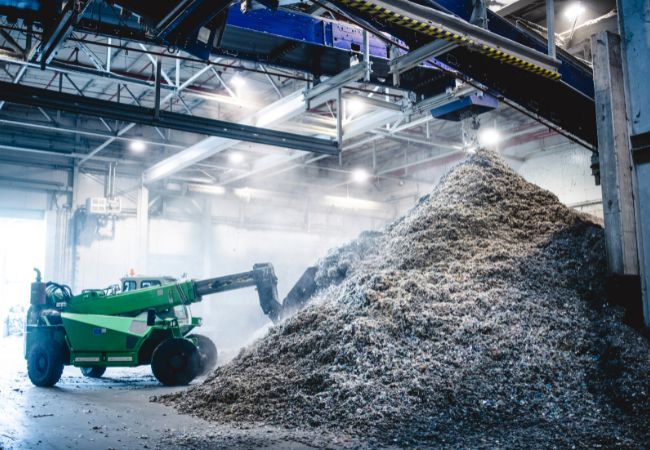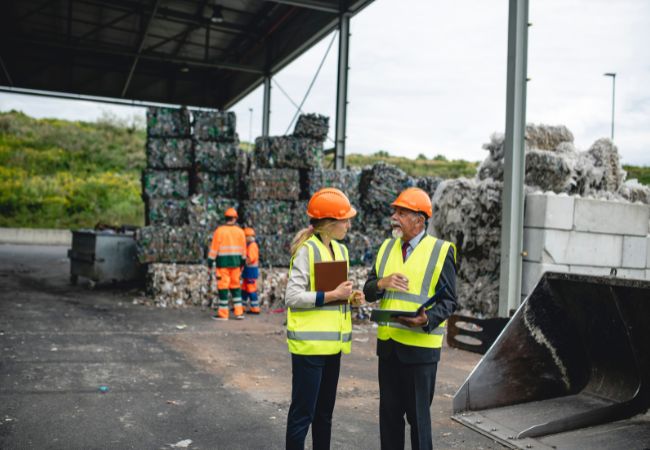Waste management has come a long way from its traditional approaches to the introduction of technology-driven solutions. This section will explore the evolution of waste management and the role that technology has played in transforming this field.

Traditional Approaches to Waste Management
Traditionally, waste management involved basic methods such as landfilling, incineration, and manual sorting. These approaches were often inefficient, costly, and had a significant impact on the environment.
Landfills, for example, lead to the accumulation of waste and the release of harmful gases into the atmosphere. Manual sorting, on the other hand, was labor-intensive and prone to human error. It often resulted in inadequate waste separation.
Introduction of Technology in Waste Management
The introduction of technology in waste management has revolutionized the industry, offering more efficient and sustainable solutions. Advancements in data analytics, the Internet of Things (IoT), and artificial intelligence (AI) have transformed waste management processes, enabling better waste optimization, smart waste management, predictive waste management, and improved waste sorting.
Technological solutions have allowed waste management companies to collect and analyze data on waste generation, collection routes, and recycling rates. This data-driven approach has facilitated better decision-making and optimization of waste management practices.
IoT devices, such as smart bins and sensors, have enabled real-time monitoring of waste levels, optimizing collection routes, and reducing unnecessary trips. This not only saves time and resources but also contributes to a more sustainable waste management system.
Artificial intelligence has also played a significant role in waste management. Predictive waste management utilizes AI algorithms to forecast waste generation patterns, enabling proactive planning and resource allocation. Machine learning algorithms have improved waste sorting processes by automating the identification and separation of recyclable materials, enhancing recycling efficiency.
The evolution of waste management from traditional approaches to technology-driven solutions has paved the way for a more sustainable and efficient waste management system. However, with these advancements come challenges and the need for ongoing innovation to address data security and privacy concerns and explore potential future trends in waste management.
Technological Solutions in Waste Management
As waste management practices evolve, technology has played a significant role in improving efficiency and sustainability. Two key technological solutions that have emerged in waste management are data analytics for waste optimization and the use of IoT devices for smart waste management.
Data Analytics for Waste Optimization
Data analytics has revolutionized waste management by providing valuable insights and optimization strategies. By utilizing advanced data collection methods and analysis techniques, waste management companies can make informed decisions to streamline their operations and reduce waste.
One key application of data analytics in waste management is route optimization. By analyzing historical data and real-time information, waste management companies can optimize their collection routes to minimize travel distance and time. This not only improves efficiency but also reduces fuel consumption, leading to cost savings and a decreased carbon footprint.
Another area where data analytics proves beneficial is in waste composition analysis. By analyzing the composition of waste, waste management companies can identify trends and patterns, allowing them to make informed decisions regarding recycling programs, waste diversion strategies, and resource allocation.
IoT Devices for Smart Waste Management
The Internet of Things (IoT) has opened up new possibilities in waste management through the use of connected devices. IoT devices provide real-time data collection and monitoring, enabling waste management companies to make data-driven decisions and respond promptly to changing waste conditions.
One key application of IoT devices in waste management is smart bin technology. Smart bins are equipped with sensors that monitor the fill level of the bin in real time. This information is then transmitted to waste management systems, allowing companies to optimize collection schedules and routes based on actual bin fill levels. This helps to prevent overflowing bins, reduce unnecessary collection trips, and improve overall operational efficiency.
Additionally, IoT devices can be used to monitor environmental parameters such as temperature, humidity, and air quality in waste management facilities. By collecting and analyzing this data, waste management companies can ensure compliance with regulatory standards, detect any potential issues, and take proactive measures to maintain a safe and healthy working environment.

Role of Artificial Intelligence
In the realm of waste management, artificial intelligence (AI) plays a significant role in revolutionizing traditional approaches. AI technologies are being employed to enhance various aspects of waste management, including predictive waste management and waste sorting processes.
AI for Predictive Waste Management
Predictive waste management utilizes AI algorithms to forecast and optimize waste collection and disposal processes. By analyzing historical data, AI systems can predict waste generation patterns, enabling waste management authorities to allocate resources efficiently. This data-driven approach helps prevent overflowing bins, optimize collection routes, and reduce unnecessary waste pickup, resulting in cost savings and improved operational efficiency.
AI algorithms take into account various factors such as population density, demographic information, and seasonal variations to generate accurate predictions. By leveraging real-time data from sensors and waste collection systems, AI can dynamically adjust waste management strategies and schedules, ensuring timely waste removal and minimizing environmental impact.
Machine Learning in Waste Sorting Processes
Machine learning, a subset of AI, is being increasingly used in waste-sorting processes. With the complexity and diversity of waste materials, traditional manual sorting methods can be time-consuming and prone to errors. Machine learning algorithms can analyze vast amounts of data and learn from patterns to automatically classify different types of waste.
Employing machine vision techniques, AI systems can identify and sort recyclable materials, hazardous waste, and organic waste. This automated sorting process enhances the efficiency and accuracy of waste sorting, reducing the burden on human workers and improving recycling rates. Machine learning algorithms continually refine their accuracy through iterative learning, making waste-sorting processes increasingly effective over time.
To illustrate the impact of AI in waste management, refer to the following table showcasing the potential benefits of AI in predictive waste management and waste sorting processes:
| Benefits of AI in Waste Management |
| Improved waste collection efficiency and cost savings |
| Optimized waste pickup schedules based on data-driven predictions |
| Reduction of overflowing bins and litter |
| Enhanced recycling rates through automated waste sorting |
| Minimization of human error in waste sorting processes |
| Increased accuracy and speed in waste classification |
Artificial intelligence is transforming waste management by leveraging advanced algorithms and data analytics. The integration of AI technologies enables predictive waste management and enhances waste sorting processes, contributing to more efficient and sustainable waste management practices.

Advantages of Technology in Waste Management
The integration of technology in waste management has brought about numerous advantages, enhancing the efficiency and sustainability of waste management processes. Let's explore two key advantages: efficiency and cost-effectiveness, and environmental impact and sustainability.
Efficiency and Cost-Effectiveness
Technology has revolutionized waste management by optimizing various aspects of the process, resulting in increased efficiency and cost-effectiveness. Here are a few ways technology brings efficiency to waste management:
- Data-driven Decision Making: The use of data analytics allows waste management organizations to gather and analyze large amounts of data related to waste generation, collection routes, and disposal. By leveraging this data, they can optimize waste collection schedules, identify areas with high waste generation, and allocate resources more effectively.
- Route Optimization: Technology enables waste management companies to optimize waste collection routes, reducing travel distance and time. This not only saves fuel but also minimizes traffic congestion and carbon emissions.
- Remote Monitoring and Sensing: IoT devices and sensors installed in waste containers can provide real-time information on the fill levels of the containers. This data helps waste management companies plan collection schedules more efficiently, avoiding unnecessary trips to empty partially filled containers.
- Automation: Automated waste sorting systems utilize robotics and machine vision technology to separate recyclable materials from general waste. This automation increases the speed and accuracy of the sorting process, reducing the reliance on manual labor.
The combination of these technological advancements improves operational efficiency, reduces costs, and optimizes resource allocation in waste management.
Environmental Impact and Sustainability
Technology also plays a crucial role in minimizing the environmental impact of waste management and promoting sustainability. Here are a few ways technology contributes to environmental sustainability:
- Waste Reduction and Recycling: Technology enables better waste segregation and sorting, facilitating recycling efforts. Automated sorting systems can identify and separate different types of recyclable materials more effectively, increasing recycling rates and reducing the amount of waste sent to landfills.
- Energy Recovery: Advanced waste management technologies, such as waste-to-energy systems, convert non-recyclable waste into energy sources like electricity or heat. This process reduces the reliance on fossil fuels and contributes to a more sustainable energy mix.
- Emission Control: Technological solutions, such as gas capture systems in landfills, help mitigate the release of greenhouse gases like methane, a potent contributor to climate change. These systems capture and utilize the gases generated by decomposing waste, reducing their environmental impact.
- Smart Waste Tracking: IoT devices and sensors can track the movement of waste throughout the waste management process. This helps identify inefficiencies, detect illegal dumping, and ensure proper disposal, promoting accountability and transparency in waste management practices.
Leveraging technology, waste management operations can minimize their environmental footprint, conserve resources, and contribute to a more sustainable future.

Challenges and Future Trends
As technology continues to revolutionize waste management, there are both challenges and future trends that need to be considered. Two important aspects to consider are data security and privacy concerns, as well as potential future innovations in waste management.
Data Security and Privacy Concerns
With the integration of technology in waste management, the collection and utilization of data have become essential. However, this also raises concerns regarding data security and privacy. As waste management systems become more interconnected and reliant on data analytics and IoT devices, it is crucial to ensure that sensitive data is protected from unauthorized access or misuse.
To address data security and privacy concerns, waste management organizations need to implement robust cybersecurity measures. This includes secure data storage, encryption protocols, and regular audits to identify and address any vulnerabilities. Additionally, clear policies should be established to govern data collection, storage, and usage, ensuring compliance with relevant data protection regulations.
Potential Future Innovations in Waste Management
The future of waste management holds promising potential for further advancements in technology. Here are some potential future innovations that could shape the industry:
Waste-to-Energy Conversion
Waste-to-energy conversion technologies aim to transform waste into usable energy sources, reducing reliance on fossil fuels and minimizing the environmental impact of waste. These technologies include anaerobic digestion, incineration, and gasification. By harnessing the energy potential of waste, these innovations can contribute to a more sustainable and circular waste management system.
Robotics and Automation
Robotic technologies have the potential to revolutionize waste management processes. Automated sorting systems can enhance the efficiency and accuracy of waste sorting, reducing the reliance on manual labor. Additionally, robotics can be employed for tasks such as waste collection, street cleaning, and maintenance of waste management facilities, improving overall operational efficiency.
Blockchain for Transparency and Traceability
Blockchain technology offers the potential to enhance transparency and traceability in waste management processes. By utilizing blockchain, waste management organizations can create an immutable record of waste generation, collection, transportation, and disposal. This can help to ensure compliance with regulations, track the movement of waste, and enable greater accountability within the waste management industry.
Advanced Sensor Technology
Advanced sensor technology can play a crucial role in waste management by providing real-time data on waste levels in containers, optimizing waste collection routes, and monitoring environmental conditions. These sensors can provide valuable insights to waste management organizations, enabling them to make data-driven decisions and improve overall operational efficiency.
Ready to Transform Your Waste Management?
Technology is revolutionizing how we handle waste, from smart bins to advanced recycling systems. Are you interested in learning how to harness its power for a cleaner, more sustainable future?
LK Tech can help you leverage technology to optimize your waste management processes. As a Cincinnati-based IT services company, we specialize in providing innovative solutions tailored to your specific needs.
Contact us today to discuss your waste management challenges and explore how technology can be your solution!


